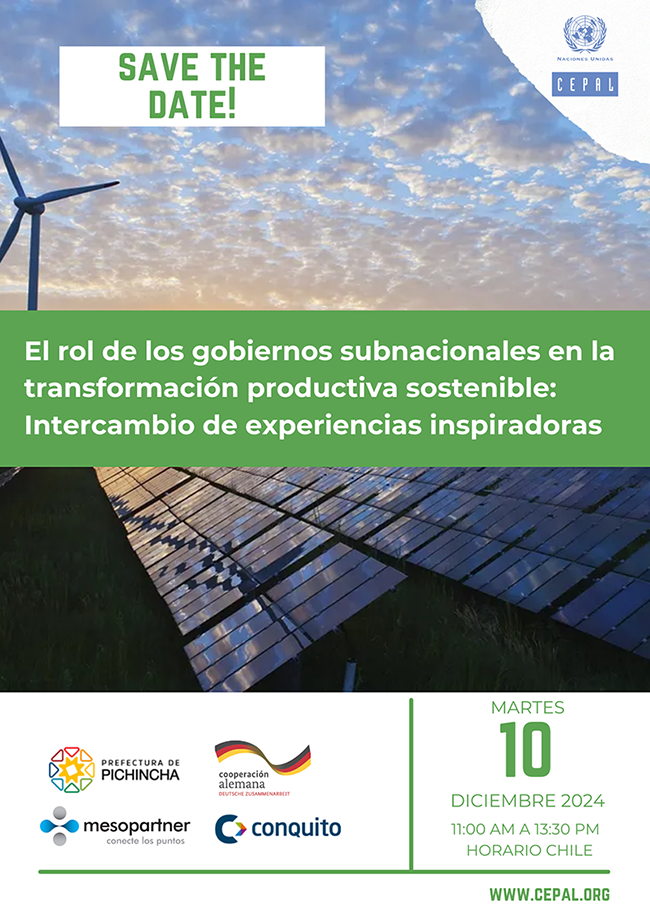The Role of Subnational Governments in Sustainable Productive Transformation: Sharing Inspiring Experiences
Work area(s)
Topic(s)
Event information

Date
10 Dec 2024, 08:00 - 10:30Event type
Participation
Background
Sustainable productive transformation as an innovation approach for productive sectors
Sustainable transition has become a key focus for promoting economic development and innovation, as well as to address climate challenges. This concept seeks to align climate mitigation and adaptation strategies with sustainable productive transformation processes to strengthen the competitiveness and resilience of the economies.
Its implementation, through the transformation of the energy and production matrices, also promotes a territorial approach that prioritizes the well-being of citizens and inclusive development. "A green and just transition implemented with a systemic vision could help the region overcome its development 'traps' and strengthen its resilience."
Various national and regional innovation strategies in the European Union (EU) and Latin America integrate sustainability as a key axis to strengthen the systemic competitiveness of sectors and territories through the development of innovative, sustainable and socially inclusive technological and productive solutions.
The role of subnational governments
The implementation of productive policies that encourage innovation and the transition to more sustainable models includes examples such as the strengthening of the circular economy, the use of renewable energies, energy efficiency in productive sectors, the promotion of more sustainable value chains and collaboration with networks of actors and local innovation systems to find solutions. among others.
A sustainable, inclusive and just transformation requires the leadership of subnational governments. To achieve this, public institutions are required to facilitate the construction of a strategic vision, contextualized and capable of articulating with other key actors in their territories.
Due to their proximity to local businesses, communities, and productive sectors, subnational governments have the opportunity to lead the transformation, acting as catalysts for innovation and promoting governance structures that ensure sustainability. To achieve this, it will be essential to strengthen their capacities to promote transformation and productive innovation. This includes the exchange of experiences of inspiring practices, tools for the integration of economic and sustainable development policies at the territorial level and the articulation between local, national and international initiatives that generate synergies for sustainability.
Event Objectives
- To offer an overview of the relevance of sustainable productive transformation in Latin America and Europe, emphasizing its implications and its importance for the resilience and competitiveness of economies.
- To present inspiring cases from Latin America and Europe on experiences of subnational governments.
- Facilitate the exchange of experiences on implementation and the role of subnational governments as a key driver of innovation and territorial transformation.
- To offer a methodological framework on how to integrate and promote sustainable productive transformation in the territories from the perspective of subnational governments.
Schedule
PROGRAMME
Welcome Remarks
Opening Table
Panel on Inspiring Experiences in Latin America and Europe.
Open dialogue with invited representatives of experiences and subnational governments:
Circular Economy System of the State of Querétaro (Mexico): This experience leads a cultural change towards the Circular Economy, promoting investments in innovative technologies and facilitating coordination between companies, productive development organizations, academia and government. An outstanding example of how to transform productive models towards sustainability through public-private leadership.
Representative: Marisol Guerrero - Director of the Circular Economy System of Querétaro.
Water Management in the Province of Petorca (Chile): Integrated Territorial Program (ITP) promoted by the Production Development Corporation (CORFO) Valparaiso, which aims to contribute to water resource management in the fruit sector through a more participatory and efficient governance, as well as the introduction of cutting-edge technologies. This initiative will share its experience in facing challenges related to water resources for sustainable productive development.
Sustainable Mendoza (Argentina): A cross-cutting public policy that promotes sustainability as a strategic axis in key productive sectors for Mendoza's economy, such as the wine, agroindustrial and energy sectors. This initiative fosters innovation and promotes the articulation of science and technology with impact economies, integrating economic development, social inclusion and environmental care.
Green Industry Cluster of Mannheim and Neckar-Alb (Germany): This productive articulation initiative focuses on the promotion of green technologies with the aim of attracting green technology companies, strengthening existing ones and offering solutions to companies in traditional industries.
Exchange Space
Discussion with participants and invited representatives of subnational governments.
Promotion of Sustainable Productive Transformation from Subnational Governments
Recovery of learning and presentation of a methodological model for subnational governments.
Closing remarks